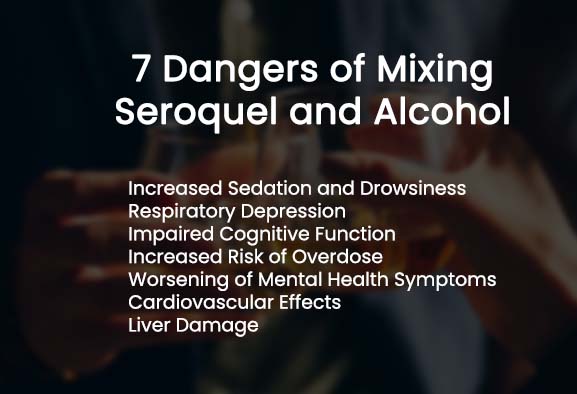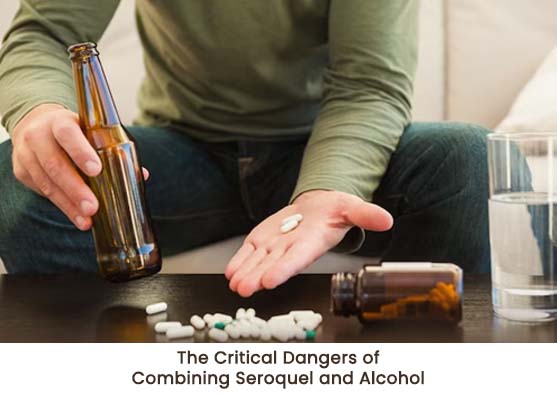When it comes to your health, certain combinations can be particularly hazardous. One such combination is the mixing of Seroquel and alcohol. Understanding the risks associated with this blend is paramount to safeguarding your well-being.
Let’s get into the critical reasons why avoiding this combination is crucial.
What is Seroquel?
Seroquel, also known by its generic name quetiapine, is a prescription medication used primarily to treat conditions like schizophrenia and bipolar disorder. It belongs to a class of drugs called atypical antipsychotics and works by helping to restore the balance of certain neurotransmitters in the brain, such as dopamine and serotonin.
How Does Seroquel Work?
Uncertainty surrounds Seroquel’s precise mode of action. Nonetheless, it’s thought to mainly work with the brain’s serotonin and dopamine receptors. Seroquel lessens hallucinations, controls the levels of these neurotransmitters, and blocks specific receptors to help regulate mood and other symptoms related to mental health issues.
(Know how long alcohol withdrawal lasts in our latest blog)
7 Dangers of Mixing Seroquel and Alcohol

Combining Seroquel, a potent antipsychotic medication, with alcohol can lead to severe consequences. Understanding the risks associated with this dangerous combination is crucial for your health and safety. Here are seven reasons why mixing Seroquel and alcohol should be avoided at all costs:
Increased Sedation and Drowsiness:
Seroquel already has sedative effects on its own, causing drowsiness and impairing motor function. When alcohol is introduced into the mix, these effects are amplified. You may experience extreme drowsiness, making it difficult to stay awake or concentrate.
Respiratory Depression:
Both Seroquel and alcohol can depress the central nervous system, slowing down vital functions such as breathing. Combining the two substances heightens the risk of respiratory depression, which can be life-threatening, especially in cases of overdose.
Impaired Cognitive Function:
Alcohol and Seroquel impair cognitive function independently. When used together, they can severely damage your ability to think, make decisions, and react appropriately to situations. This can increase the risk of accidents and injuries.
Increased Risk of Overdose:
Mixing Seroquel and alcohol significantly increases the risk of overdose. Both substances affect neurotransmitters in the brain, and combining them can lead to unpredictable reactions. An overdose can result in coma, seizures, or even death.
Worsening of Mental Health Symptoms:
Seroquel is often prescribed to manage psychiatric conditions such as schizophrenia and bipolar disorder. However, alcohol can exacerbate symptoms of these disorders and interfere with the effectiveness of the medication. Mixing the two can lead to a worsening of mental health symptoms and increase the risk of relapse.
Cardiovascular Effects:
Both Seroquel and alcohol can have adverse effects on the cardiovascular system. Mixing them can increase heart rate, high blood pressure, and irregular heart rhythms. These effects can be dangerous, especially for individuals with pre-existing heart conditions.
Liver Damage:
Alcohol is metabolized in the liver, and chronic alcohol consumption can lead to liver damage or disease. Combining alcohol with Seroquel can put additional strain on the liver, increasing the risk of liver damage and interfering with the body’s ability to metabolize medications effectively.
(Check out our new blog on How Long Alcohol Stays in Your System)
Seroquel and Alcohol Withdrawal Symptoms
Withdrawal symptoms from Seroquel and alcohol can vary in severity and duration, depending on factors such as dosage, duration of use, and individual physiology. Common withdrawal symptoms may include:
-
Insomnia and Sleep Disturbances
: Both Seroquel and alcohol can affect sleep patterns. Withdrawal may result in difficulty falling asleep or staying asleep.
-
Anxiety and Agitation: Discontinuing Seroquel and alcohol can lead to heightened anxiety levels and feelings of agitation.
-
Nausea and Vomiting: Gastrointestinal symptoms such as nausea and vomiting are common during withdrawal from both substances.
-
Headaches: Withdrawal may trigger headaches or migraines as the body adjusts to the absence of Seroquel and alcohol.
-
Sweating and Fever :
Profuse sweating and low-grade fever may occur as the body detoxifies from Seroquel and alcohol.
-
Mood Swings: Emotional instability, mood swings, and irritability are typical withdrawal symptoms.
-
Tremors and Seizures: In severe cases, withdrawal from alcohol or Seroquel can lead to tremors or even seizures.
(Get to know about street names for alcohol and its types in this blog)
Treatment Options For Seroquel and Alcohol Overdose At All American Detox
When dealing with a Seroquel and alcohol overdose, seeking immediate treatment is crucial for ensuring the best possible outcome. At All American Detox, we prioritize the well-being of our clients and offer comprehensive treatment options tailored to address such emergencies effectively.
Prompt Intervention and Assessment:
Upon arrival at our facility, individuals experiencing a Seroquel and alcohol overdose undergo a prompt assessment by our medical team. This assessment aims to evaluate the severity of the overdose and identify any co-occurring medical conditions that may require immediate attention.
Medical Detoxification:
For individuals struggling with substance abuse, including Seroquel and alcohol misuse, medical detoxification is often the first step toward recovery. Under the supervision of our experienced medical staff, patients undergo a structured detox process aimed at safely eliminating toxins from their bodies while managing withdrawal symptoms.
Mental Health Evaluation:
Overdose often indicates underlying issues such as substance abuse disorders or mental health conditions. A comprehensive psychiatric evaluation is crucial to address these underlying issues and plan appropriate treatment.
Rehabilitation Programs:
Long-term treatment plans may include inpatient or outpatient rehabilitation programs focused on recovery from substance abuse and mental health support. These programs offer therapy, counseling, and education to help individuals understand their conditions, manage symptoms, and develop coping strategies.
Aftercare and Support:
Continuous support through aftercare programs, such as support groups or ongoing therapy, is essential for maintaining sobriety and mental health. These programs provide a network of support to prevent relapse.
Conclusion
The combination of Seroquel and alcohol poses significant risks to your health and well-being. From heightened sedation and impaired cognitive function to increased overdose risk and worsened mental health symptoms, the dangers are multifaceted.
At All American Detox, we understand the seriousness of a Seroquel and alcohol overdose. We are committed to providing compassionate care and effective treatment to those in need.
If you or someone you know is struggling with substance misuse, don’t hesitate to reach out for help. Our dedicated team is here to support you on your journey to recovery.

